.
27.04.2015

Progress 59 will launch and dock to the station Tuesday, April 28 with almost three tons of food, fuel and supplies for the station's Expedition 43 crew.
NASA TV will begin at 2:45 a.m. The spacecraft will launch at 3:09 a.m. (1:09 p.m. Baikonur time) from the Baikonur Cosmodrome in Kazakhstan, make a four-orbit, six-hour trip to the space station and dock at 9:07 a.m. Docking coverage will begin at 8:30 a.m.
Quelle: NASA
.
Update: 28.04.2015
.

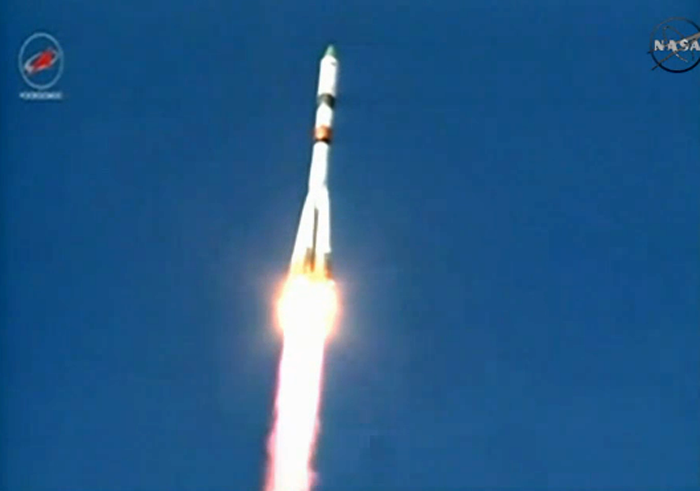
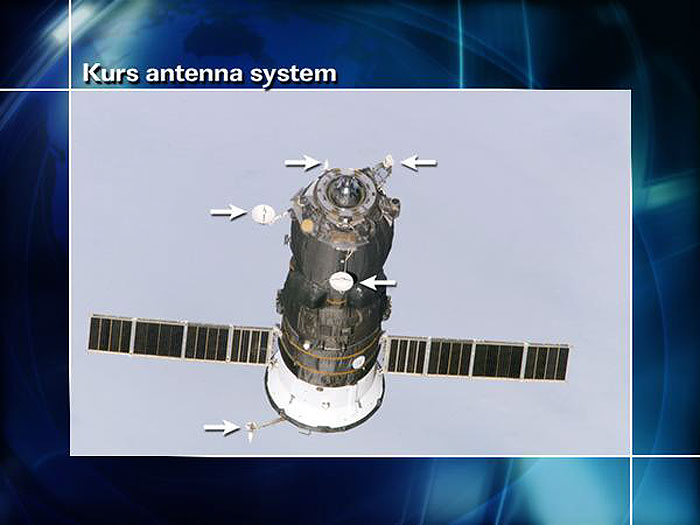
---
Ankunft bei ISS





...


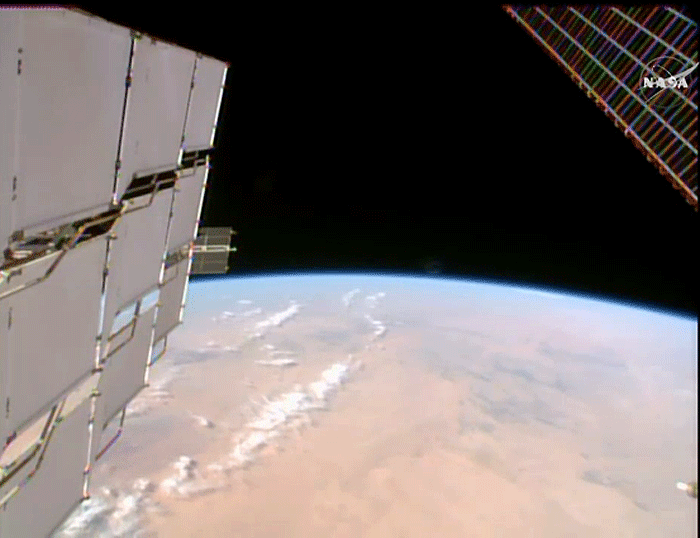
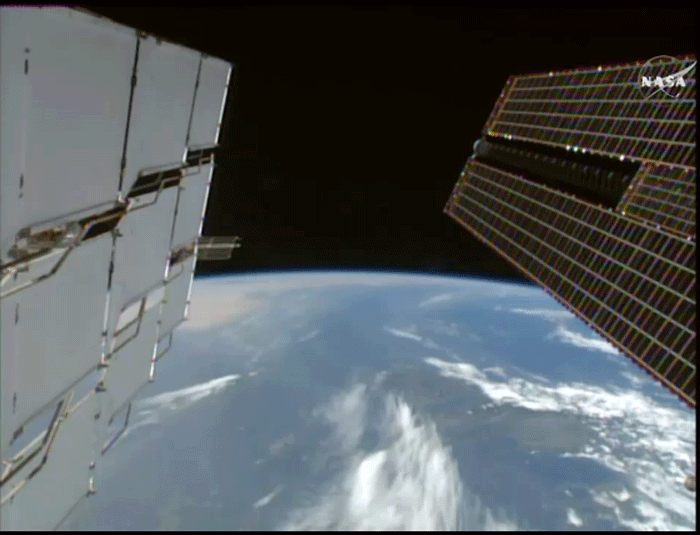
...
Two docking system antennas failed to open on Russian space freighter
The cargo spacecraft that was launched to the International Space Station (ISS) on Tuesday morning has been transferred to a two-day scheme of docking to the ISS
Two out of five antennas of the Kurs docking system failed to open on Russia’s Progress M-27M space freighter launched on Tuesday, a source in the rocket and space industry said.
"Two antennas did not open on the Progress space freighter launched today. In the next hour and a half, i.e. at the next circuit when the spaceship flies over the territory of Russia, an additional package of commands will be sent to it for these antennas to open," the source said.
The source said a set of extra commands for unfolding the antennas will be dispatched to the spacecraft during next orbit.
Russia’s space control center earlier did not confirm information that the antenna of the Kurs docking system failed to open on the space freighter.
"I don’t have such information. The only thing I can say is that the spacecraft was delivered into orbit close to the designated one. At the first stage of the spacecraft’s autonomous flight, we started to receive telemetric data with interruptions," a spokesman for the mission control said.
The Mission Control Center told TASS that the cargo spacecraft that was launched to the International Space Station (ISS) on Tuesday morning has been transferred to a two-day scheme of docking to the ISS.
The reserve date for docking the Progress cargo spacecraft M-27M at the International Space Station is May 2.
"According to preliminary estimates on April 30 the docking will be possible at 12:02 Moscow time," the source said. If the docking attempt on that day fails, 11:53 of May 2 has been identified as the reserve time slot," the center said.
Quelle: TASS
.
Update: 21.45 MESZ
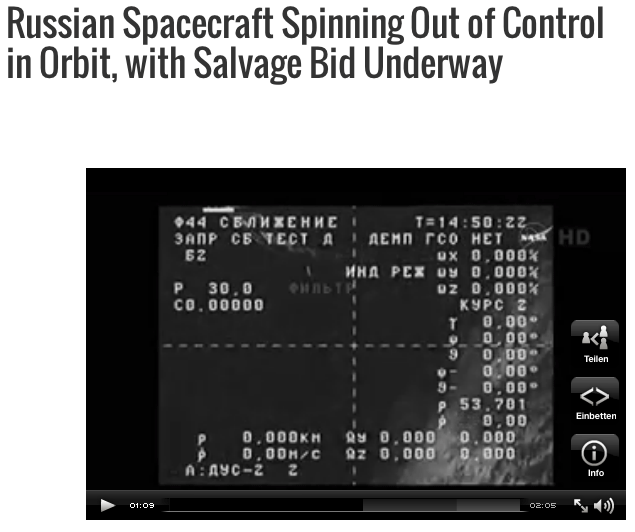
The Russian space agency Roscosmos is scrambling to regain control of a robotic Progress 59 cargo ship that appears to have suffered a serious malfunction shortly after launching into orbit early today (April 28).
Video from the Progress 59 spacecraft showed it in a dizzying spin, with the Earth and sun rapidly coming into and then out of frame. Russian flight controllers abandoned plans to attempt to dock the cargo ship with the International Space Station on Thursday (April 30), NASA spokesman Rob Navias said in a NASA TV update. That docking — originally scheduled for this morning, then pushed to Thursday — is now "indefinitely postponed," Navias said.
The problems began shortly after Progress 59 launched into space atop a Russian Soyuz rocket from Baikonur Cosmodrome in Kazakhstan. Liftoff occurred at 3:09 a.m. EDT (0709 GMT), with the cargo ship packed with just over 3 tons of food, fuel and other supplies.
"Almost immediately after spacecraft separation, a series of telemetry problems were detected with the Progress 59," Navias said during a televised broadcast from NASA's Mission Control center at the Johnson Space Center in Houston. "No confirmation of navigational antenna deploy or of the pressurization of the manifold system for the propulsion system on the spacecraft was received."
Russian flight controllers attempted to regain control of Progress 59 as the spacecraft made four orbits around Earth, with no success. Late tonight, the spacecraft will make another series of passes over Russian ground stations, and flight controllers will resume their recovery work then, Navias said.
"The crew on board the International Space Station has pressed ahead with maintenance work today as well as biomedical experiment activities," he added. The station's current Expedition 43 crew includes three Russians, two Americans and one Italian astronaut.
Russia's Progress spacecraft are disposable robotic cargo ships that have served as workhorse resupply vehicles for the International Space Station. They have been restocking the station since the first crews took up residence in 2000 and have a long track record of success. In August 2011, a launch malfunction led to the crash of the Progress 44 cargo ship.
Progress vehicles are equipped with a Kurs automated navigation system that allows them to make autonomous dockings with the space station. A backup system, called the Telerobotically Operated Rendezvous Unit, allows cosmonauts on the station to take manual remote control in the event of a Kurs system failure.
Progress spacecraft have a similar three-module appearance to Russia's manned Soyuz space capsules. Instead of a crew capsule, Progress vehicles carry a tanker module filled with propellant for use in reboosting the space station's orbit.
Russia's Progress vehicles are part of a fleet of robotic spacecraft that routinely deliver supplies to the International Space Station. Robotic ships from Japan and Europe have made supply runs, as well as commercial spacecraft built by the U.S. companies SpaceX and Orbital Sciences Corp., which fly delivery missions for NASA.
The most recent cargo ship to visit the space station was the unmanned SpaceX Dragon capsule, which launched on April 14 and arrived at the orbiting lab on April 17.
Quelle: SC
------
Mission Control may try to stop rotation of Progress spacecraft tonight
Earlier, the spacecraft's close-up and docking navigation system Kurs and the onboard video camera were switched on
Mission Control Center near Moscow will make another attempt tonight to establish contact with the cargo spacecraft Progress M-27M and to use a remote control mode of operation in order to stop the spacecraft’s erratic rotation, a source in the space rocket industry has told TASS.
"Experts have now paused attempts to contact the spacecraft. The first communication session is due on Wednesday, at 03:50 Moscow time. It will last about 15-16 minutes. It is not ruled out specialists will use the teleoperated mode of control to stop spacecraft’s rotation, although the chances of success are few, because the direction of rotation remains unclear. As soon as it has been established, teleoperated mode of control will be employed," the source said.
TASS has no official confirmation yet.
Earlier, the close-up and docking navigation system Kurs and the onboard video camera were switched on.
The Soyuz-2.1a rocket with a Progress spacecraft blasted off from the Baikonur space site in Kazakhstan on Tuesday morning. Soon it turned out that telemetry from it was not available and the spacecraft itself had entered an undesignated orbit. A source in the space industry told TASS that without correcting the orbit the spacecraft might be lost.
Quelle: TASS
4081 Views
